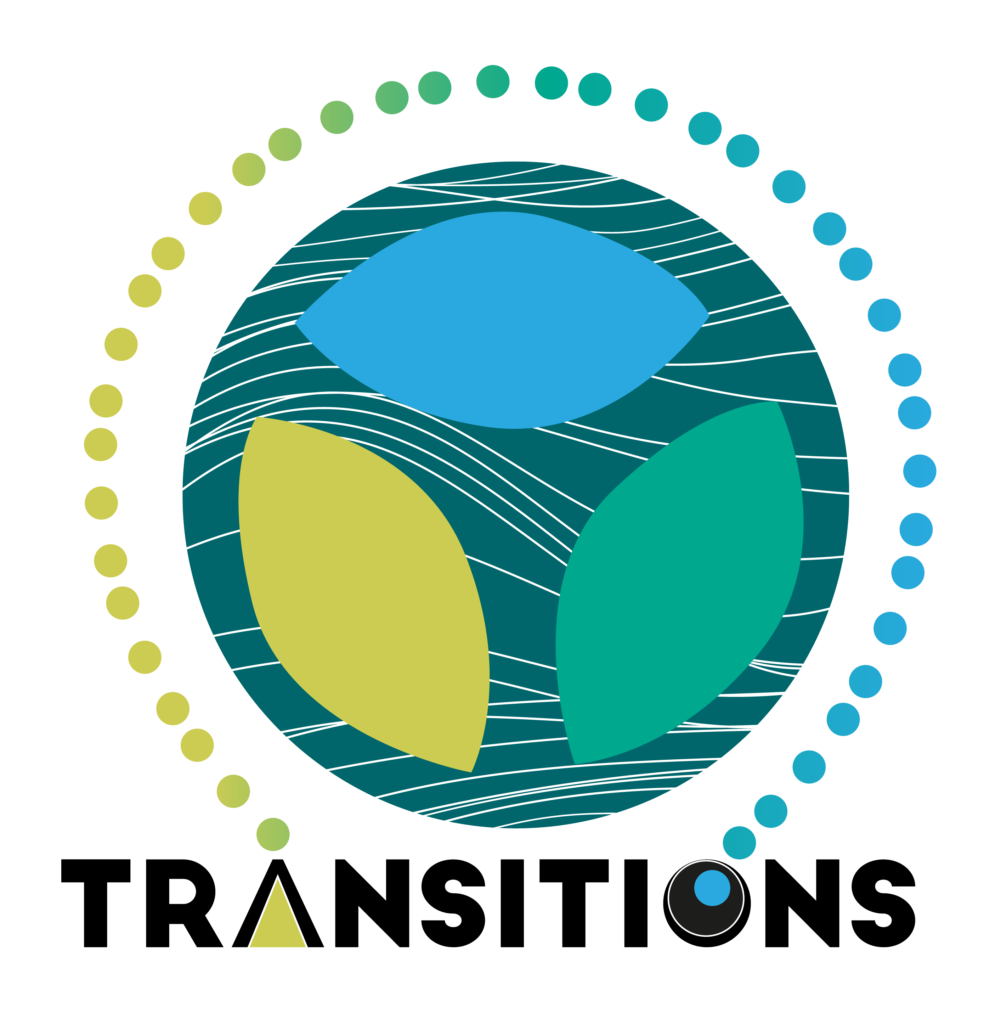
Inclusive digital tools to scale climate-informed agroecological outcomes
A project of the Agroecological Transition Program for Building Resilient and Inclusive Agricultural Food Systems (TRANSITIONS)
Key messages
• Digital tools are often top-down or extractive, hindering inclusivity & addressing farmers’ needs.
• Smallholder farmers in LMICs usually lack influence and access to digital resources aligned with their priorities, limiting their participation in climate action and sustainable agriculture.
• Prioritizing access, usability, & co-creation elements in digital resource development can enhance social inclusion & empower smallholders.
• Co-creation of farming practices with farmers supports solutions relevant to farmers’ contexts, integration of multiple knowledge systems, collaborative problem solving & gives farmers more agency.
• Farmer workshops in Brazil and Vietnam highlight challenges and opportunities for improving digital tool design, enhancing farmers’ agency & collaborative problem-solving in agriculture.
• Solidaridad and IRRI developed digital tools for co-creating agroecological livestock practices in Brazil (Solis) and performance assessment for rice systems in Vietnam (FaMoRe).
Project overview
Digital resources in agriculture are changing how food is produced and inclusive digital tools can transform agriculture at large scales. However, inclusive digital tools are not widely used by smallholders, women, the rural poor, and other marginalized groups in low- and middle-income countries (LMICs).
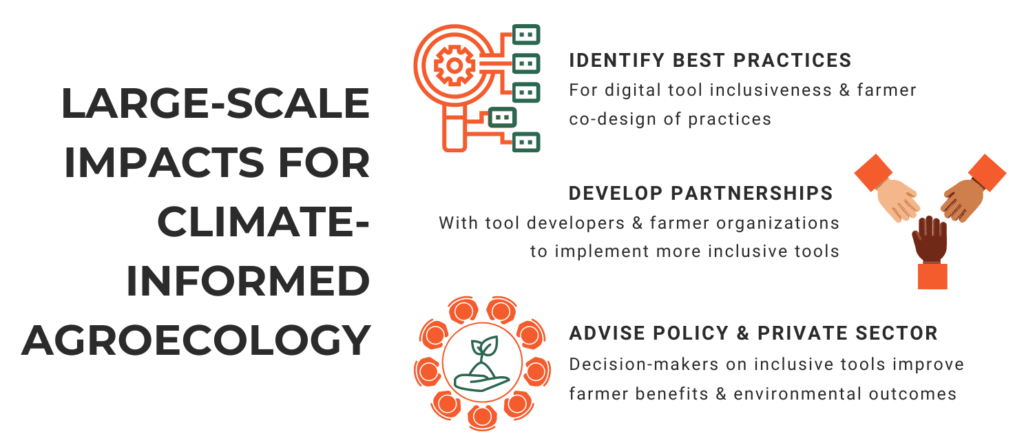
Involving farmers in the co-design of knowledge is a key principle of agroecology. If digital platforms are to be a major driver for scaling up agroecology, it is essential to support inclusive tool use and farmer co-design of practices to address LMICs’ needs. Therefore, the ATDT Project will evaluate how farmers benefit from using improved digital tools and their potential to generate large-scale impacts for climate-informed agroecology (Figure 1).
The Agroecological TRANSITIONS’ Inclusive Digital Tools (ATDT) project will promote innovations related to digital tools and their interfaces that enhance inclusiveness, integrate climate change resilience and mitigation with agroecological aims, and enable farmers to develop new practices (Figure 2).
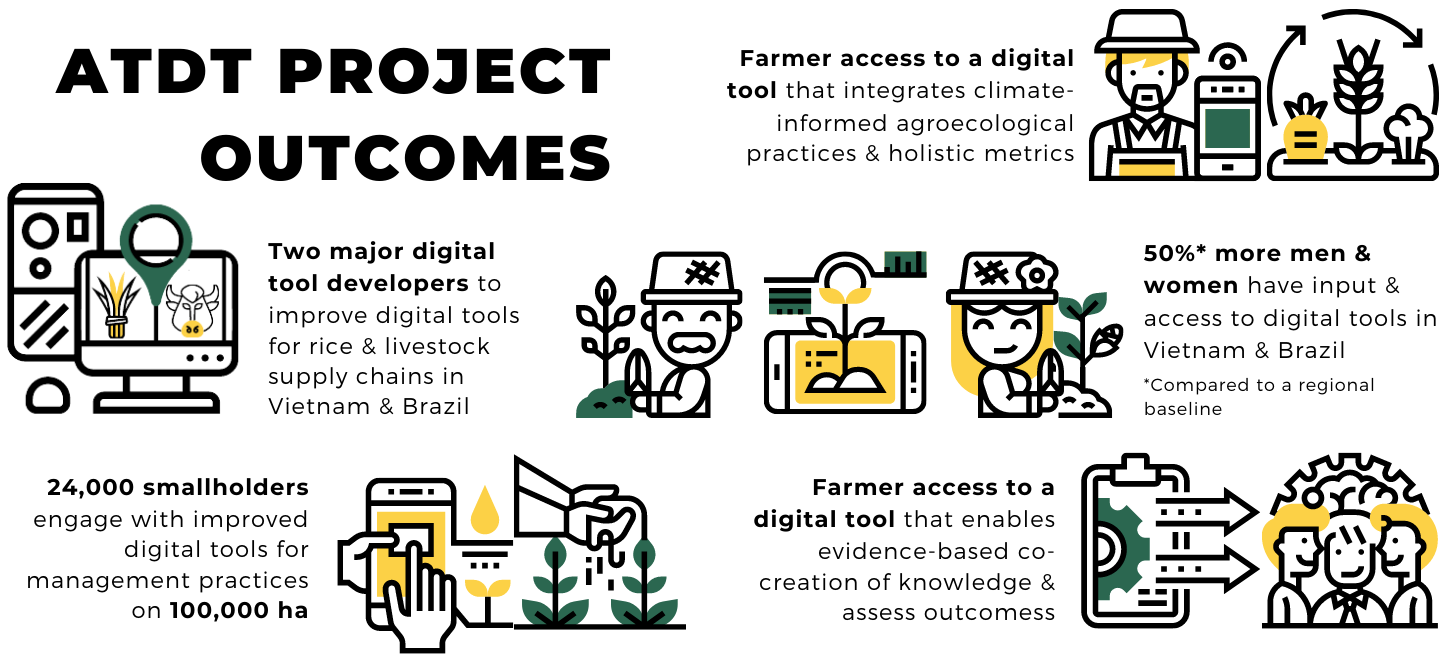
Activities & outputs
To achieve its goals, the ATDT Project has strategically planned activities and outputs to assess the global and site-specific digital ecosystems, improve digital tools to engage farmers in the co-creation of knowledge, and test and evaluate digital tool innovations for scaling up climate-informed agroecological outcomes.
Regions & supply chains
Rice systems in Mekong River Delta, Vietnam
Sustainability standards are prominent within Vietnam in higher-value crops, like coffee and cocoa. However, they are less prevalent in staple crops, like rice. To address this in Vietnam’s Mekong River Delta region, the International Rice Research Institute (IRRI) and local stakeholder partners, will support the development, design, and improvement of digital tools facilitating agroecological practices for rice farmers. The Vietnam team and IRRI will focus research on advanced farming packages that promote agroecological production and reduce greenhouse gas emissions while enhancing farmers’ income.
Livestock landscapes in Pará, Brazil
The Brazil team, led by Solidaridad Latin America, will support the improved use of good agronomic practices and traceability tools for incentives to smallholders and recognition of their livestock production practices. The team will work in the Amazon agriculture frontier of the states of Pará and Mato Grosso, Brazil. With this purpose in mind, the Brazil team will review the inclusivity of existing tools, map and systematize knowledge on production practices, and influence tool access, design, and improvement to support agroecological transitions.
Part of a bigger picture: Agroecological TRANSITIONS
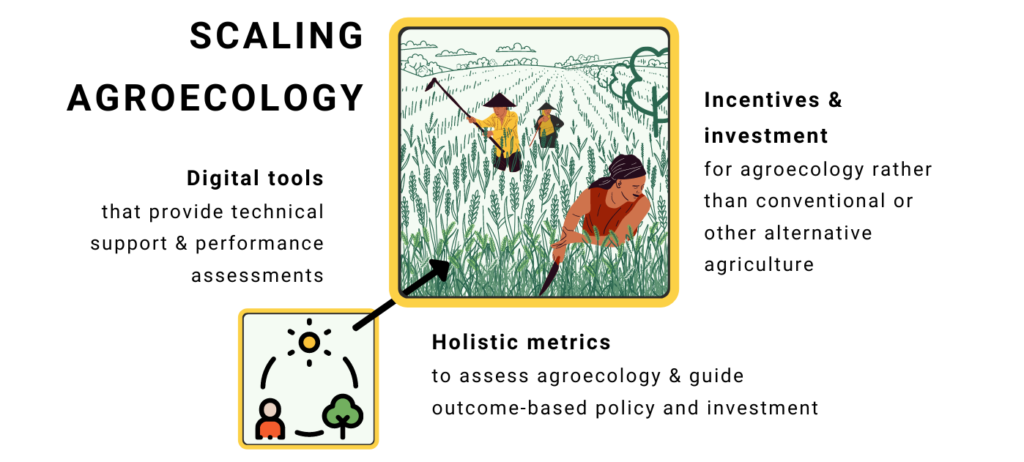
Agroecological approaches are increasingly promoted as a means to improve sustainable development outcomes of food systems to ensure regenerative use of natural resources and ecosystem services while addressing the need for more socially equitable decision-making.
In LMICs, agricultural investment remains a priority for economic development. Climate-informed agroecological transitions require supporting farmers to shift to more intensive production systems while minimizing negative ecological and human impacts.
Yet, supporting farmers’ transition to agroecology globally has been constrained. The CGIAR’s Program on Agroecological Transitions for Building Resilient, Inclusive, Agricultural and Food Systems (TRANSITIONS) aims to address these constraints by enabling climate-informed agroecological transitions by farmers in LMICs through the development and adoption of holistic metrics for food and agricultural systems performance, inclusive digital tools and transparent private sector engagement.
More information
Project title: Inclusive Digital Tools to Enable Climate-informed Agroecological Transitions
Duration: 2021-2024
Funding: Funded by the European Union through its DeSIRA Initiative. Managed by the International Fund for Agricultural Development
Partners
Alliance of Bioversity International and the International Centre for Tropical Agriculture (CIAT) [Principle Implementor]
University of Vermont & Gund Institute for Environment
International Rice Research Insitute (IRRI)
Key messages & findings
Findings from a review of digital tools
We conducted expert interviews and a review of digital resources relevant to climate change and agroecology to identify exemplary features of digital tools. Overall, we found few digital tools with functions for agricultural technical advice and performance assessment related to agroecology and found limited climate change adaptation and mitigation information. However, many have components of agroecology (44 of 230). Of these 44:
- <20% of tools supported climate change action
- ~33% addressed 4 or fewer agroecology principles
- About half addressed whole-system design
- ~30% of tools included features for communication with tool users
- 25% had farmer-driven content such as agro-advisory videos recorded by farmers
- 43% had 2-way communication such as SMS, voice calling, or in-app communication
Resources: Global digital tool review for agroecological transitions [data], Digital tools for climate change adaptation & mitigation & Exemplary features of digital tools for agroecology
Messages for principles for inclusion
Principles for socially inclusive digital tools for smallholder farmers: A guide seeks to address concerns with the current digitalization of food systems (Shelton et al., 2022), including:
- Many digital tools designed for food systems are irrelevant to smallholder farmers’ situations or have inaccessible content by use of paid subscriptions or not using local languages.
- Marginalized groups are often the last to benefit from new technology and are at the greatest risk of privacy and data rights violations.
- Few tools include progressive sustainability practices such as low-emission agriculture, climate change adaptation or agroecology, or robust scientific evidence behind technical advice and performance assessment.

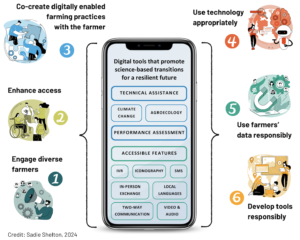
Regional lessons from digital innovation process with farmers
Brazil: Livestock systems in Pará
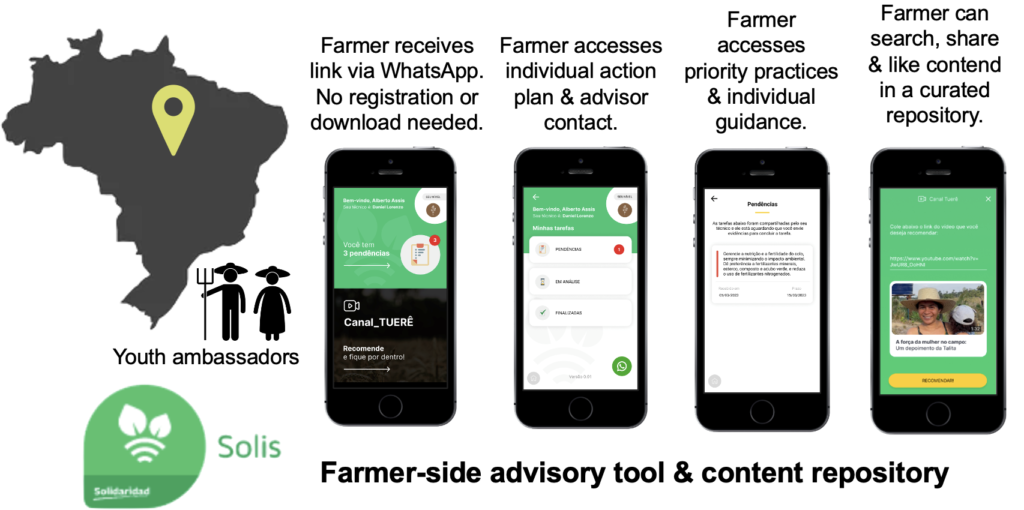
Solidaridad’s tool (Solis) replicates the user experience of social platforms used by producers (i.e., WhatsApp). The tool combines top-down (expert-to-farmer) with bottom-up (farmer-to-expert) & peer-to-peer (farmer-to-farmer) communication to foster the co-creation of locally relevant agroecological practices. Lessons include:
- The role of technical advisors is still key
- Need to curate content
- Business models of tool developers can still have trade-offs for inclusion
Vietnam: Rice systems in the Mekong River Delta
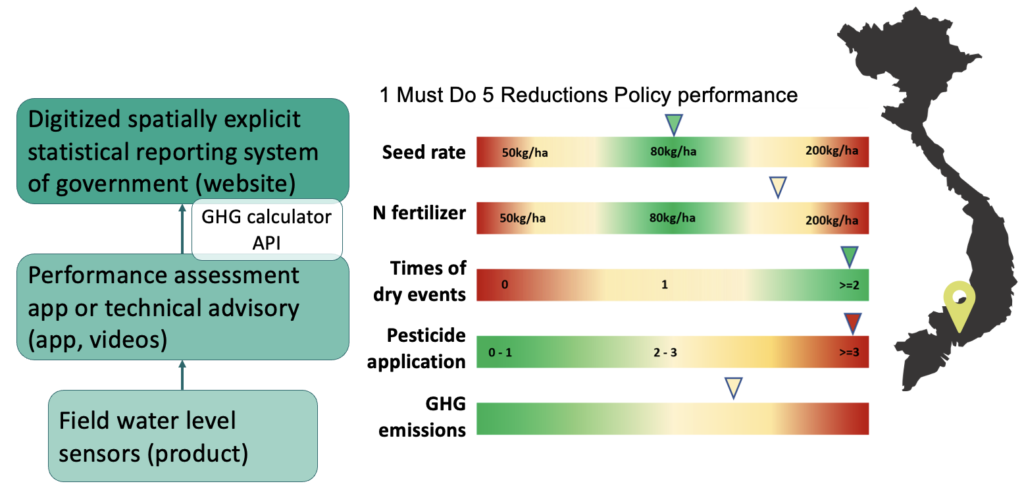
FarMoRe, a farm management reporting smartphone app in Vietnam, was co-designed with field agents and farmers and is intended to assess farmers’ performance over time. Through an application programming interface (API) of a rice-specific GHG calculator, the users receive data on their GHG emissions from farming as well as their benchmarked performance on other practices. FarMoRe was linked to an improved and digitized regional-level system, RiceMoRe, to ensure the uptake and support from policy, as well as longer-term sustainability and financing required for the maintenance of digital resources. Lessons include:
- Face-to-face interactions are preferred by farmers and field agents. So, digital tools should support in-person interactions, rather than replace in-person interaction.
- Two-way interactions in digital tools would be more beneficial for farmers & field agents.
ATDT Outputs
JOURNAL ARTICLES
BRIEFS
Digital agency: Empowering farmers to co-create knowledge on agroecology practices
Socially inclusive digital tools for agriculture: A way forward
Digital tools for climate change adaptation & mitigation
Exemplary features of digital tools for agroecology
Inclusive Digital Tools for Agroecological Transitions [poster]
Socially inclusive decision support tool for smallholder sustainable intensification and soil health
Co-creation applied to digital innovations for smallholder farmers: An example from Brazil
Digital tools for supporting climate-informed agroecological transition in beef production in Brazil
Key actions to develop inclusive digital resources for smallholder cattle ranchers in Brazil
Best practice guidance for inclusive digital tool development for sustainable rice in Vietnam
REPORTS
Outcome Report: Agroecological Transitions: Inclusive Digital Tools (ATDT)
Principles for socially inclusive digital tools for smallholder farmers: A guide [UPDATED: Version 2]
Global digital tool review for agroecological transitions [data]
Livestock practices, use of digital tools and co-design and flow of information: Brazil baseline
Relatoria das entrevistas e webinar para o levantamento de percepções de representantes da cadeia da pecuária sobre o desenvolvimento de recursos digitais inclusivos na implementação de boas práticas (Portugeues, includes EN Summary)
Field testing digital tools insustainable rice production in the Mekong Delta, Vietnam
Improving rice sustainability [in Vietnam] through digital tools
Use of digital tools in sustainable rice production in the Mekong Delta, Vietnam
NEWS
OCT 2024: Put farmers first when scaling agroecology tech, say experts
MAR 2024: What’s needed to make agroecology mainstream?
DEC 2023: Solidaridad blog on co-creation workshops [Portuguese] [English]
SEP 2023: Use of digital tools in sustainable rice production in the Mekong Delta, Vietnam (CGIAR)
SEP 2023: TRANSITIONS: Inclusive digital tools to scale smallholder agroecology
AUG 2023: Brazil farmer workshop with Solidaridad
APR 2023: Inclusive digital tools to scale smallholder agroecology
JAN 2023: What makes an “exemplary” digital solution for agroecology?
NOV 2022: New TRANSITONS program tackles three roadblocks to scale up agroecology
EVENTS
SEP 2024: Using digital tools to support climate & agroecological transitions at scale
FEB 2024: Transitions for our Futures [recording]
DEC 2023: COP28 Food Systems Pavilion Towards equitable food systems: Nourishing communities and empowering stakeholders
NOV 2023: Scaling up digital co-creation for sustainable rice and livestock practices
OCT 2023: Use of digital tools in sustainable rice production in the Mekong Delta, Vietnam
OCT 2023: OpenTeam In-Depth Collaborative Innovations in Digital Tools for Climate-Smart Agriculture
JUN 2023: Africa Agribusiness & Science Week Climate Change Resilience and Agroecology
May 2023: Aim4Climate Summit Digital resources for inclusive climate change action in agriculture
APR 2023: OpenTeam In-Depth Principles for Inclusion & Development [blog]
FEB 2023: Agroecology Transformation Partnership Platform First Annual Members Forum [blog]
NOV 2022: Best practices for digital tool inclusiveness and farmer co-creation
OCT 2022: Driving the Agroecological Transition [recording] [blog]
MAY 2022: Global Digital Development Forum: Farmer co-design of climate change solutions
Further Resources
- Alliance Multifunctional Landscapes
- Transformative Partnership Platform on Agroecology (TPP)
- AE TPP Community of Practice
- OneCGIAR Initiative: Transformational Agroecology Across Food, Land & Water Systems
- Alliance Research on Improving Food Systems Through Agroecology
The header photo was taken by JP Sinohin (IRRI, 2013) and shows Joan Villoria, an agricultural extension agent, and farmer Angel Bautista using the Rice Crop Manager in Los Banos, Philippines.
This content was originally published on the Alliance of Bioversity & CIAT Website
For more information, please contact Sadie Shelton, Communications Officer, ATDT, University of Vermont and The Alliance of Bioversity International and CIAT.
The Agroecological Transitions for Building Resilient, Inclusive, Agricultural and Food Systems (TRANSITIONS) Program is funded by the European Union through its DeSIRA initiative and managed by the International Fund for Agricultural Development (IFAD). The TRANSITIONS Inclusive Digital Tools (ATDT) project aims to support the use of digital resources and citizen science to empower farmers to co-create, adapt, and innovate practices for climate-resilient and low-emission agroecological outcomes at large scales. Find a list of ATDT outputs here. The contents and opinions expressed in this publication are not peer reviewed and are the sole responsibility of the authors. They do not necessarily reflect the views of the European Union, IFAD or affiliated organizations.

